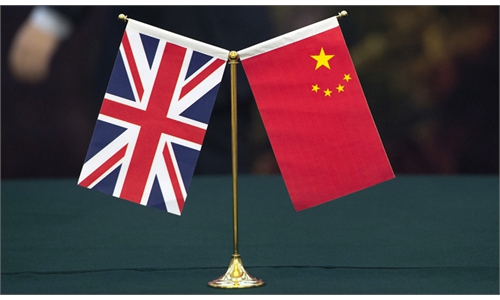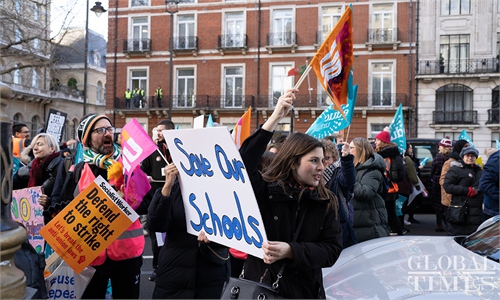
As UK inflation rose more than 10 percent in January, strikers are demanding pay rises to cover surging food and energy bills. Photo: Wang Yimo
While the global economy has taken severe hits from the COVID-19 pandemic, the Russia-Ukraine conflict, the surging inflation and even the energy crisis, the outlook for the UK economy seems particularly desperate among the world's major economies. What is the British government up to at this crucial moment?The Office for National Statistics said on Friday that the UK economy stagnated in the fourth quarter of 2022, with GDP growth at zero, narrowly dodging a recession, but GDP growth is expected to remain close to zero in 2023. Economic stagnation is not even the gloomiest among all the forecasts about the UK economy. Last month, the IMF predicts the UK economy will shrink by 0.6 percent in 2023, a downgrade from the 0.3 percent growth in its last review in October, meaning that the UK economy will be the only major economy to contract in 2023.
Moreover, it is due to the highest inflationary pressure in the UK in four decades that workers in the transport, education, health and postal sectors have staged a series of strikes, resulting in stoppage of public serves, adding to the UK's economic woes. Workers are demanding a pay rise so that they can pay their soaring food and energy bills.
Conventionally speaking, at a time when the economic problems have become serious enough to affect people's livelihood and cause great social discontent, the government will undoubtedly put priority to addressing economic problems and work around the clock on ways to lift the economy out of the predicament.
But the British government doesn't seem to be playing by normal rules. Instead of focusing on domestic economic issues and figuring out practical measures to address the crisis, the British government appears more eager to show its presence on the international stage.
UK Defence Secretary Ben Wallace announced on Sunday plans to assess the dangers posed by the balloons after the US shot down a series of objects, including a Chinese civilian airship, UK media outlet Mirror reported on Monday.
This is not the first time that the UK has followed the US in hyping the so-called "China threat." Over the past year, the British government frequently showed its presence on Xinjiang-related and Hong Kong-related issues, and cracked down on Chinese investment in the UK under the excuse "safeguarding national security."
It is not hard to understand that a stable relationship with China could help alleviate Britain's financial difficulties. Therefore, what the UK government has been doing is an indication that the country's foreign policy is no longer rational, sophisticated and tactful as it once was, which may be another reflection of the decline of its economic power.
As the government officials seem to be engaged in geopolitics, we can't help but wonder how much of the British government's resources are still available for addressing its economic woes. No wonder there has been no decent economic solution put forward by the UK government yet.
Another possible explanation may be that officials realize that there is little they can do to solve the current economic problems, or that they don't have the courage to implement an economic rescue plan that may trigger great pushback. So they choose to use geopolitics as a diversion for public attention.
In this sense, the decaying of the British empire seems irreversible, and the free-fall decline of the UK economy will also drag down the European economy.



